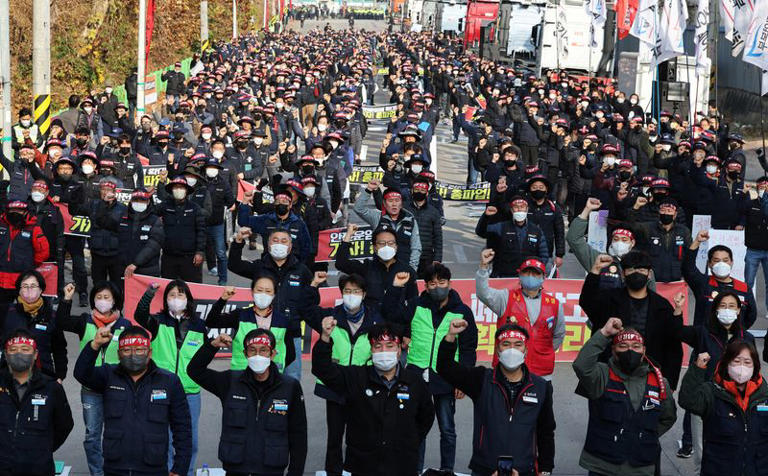Concerns are rising in South Korea over shortages of petrol and more expensive groceries after striking truck drivers defied an order from the President Yoon Suk-yoel to return to work.
With the government failing to reach a deal on Wednesday fears are growing that the dispute will inflict further economic damage.
Transport ministry representatives said that the government would not change its position. The ruling People Power Party told the union representing the 25,000 striking drivers that they must return to work before lawmakers consider a bill on demands, the union said in a statement.
Neither side has set a date for another session of talks.
On Tuesday, the Yoon government invoked a “start work” order on 2,500 drivers in the cement industry, requiring them to return to the road or face penalties. The drivers are in their seventh day of a strike over minimum pay rules.
ALSO SEE:
Former Chinese Leader Jiang Zemin Dies at 96
Petrol Stations Running Dry
“It is the government and parliament that should return to work… The government and ruling party must immediately withdraw the start-work order, which took the basic rights of cargo workers hostage, and engage in sincere dialogue,” the Cargo Truckers Solidarity Union (CTSU) said.
About 7,000 people rallied in 16 regions across the country for the strike on Wednesday, according to the transport ministry.
The stoppage is the second truckers strike in less than six months, and has caused daily losses of an estimated 300 billion won ($224 million) and disrupting industrial activity in Asia’s fourth-largest economy, set to slump next year.
As of early Wednesday, 23 petrol stations had run dry, the industry ministry said. Petrol stations nationwide had an average of about eight days of gasoline supply as they secured stock before the strike, but stations with high turnover in the Seoul metropolitan area are seeing shortages.
Out of 985 construction sites nationwide operated by 46 construction companies that submitted reports on Tuesday, work at 59%, or 577 sites, had been suspended because of a lack of supplies, the transport ministry said.
Threats From Both Sides
Transport Minister Won Hee-ryong told reporters on Wednesday that the government would issue start-work orders to more striking truckers in other sectors if necessary.
Union leaders said on Tuesday they would take legal action against such orders.
The government has relayed the start-work order to 350 of the cement transport workers as of Wednesday. If they do not comply, the government can suspend their transport licenses for 30 days, then revoke them.
Drivers may also face up to three years in jail or a fine of up to 30 million won ($22,550).
The government has repeatedly expressed unwillingness to expand a minimum pay system for truckers beyond a further three years, while the union says it should be permanent and wider in scope.
- Reuters with additional editing by Jim Pollard
ALSO SEE:
South Korea to Meet Striking Truckers as Supply Chains Suffer
South Korea’s Yoon Warns of Crackdown on Truckers Strike
























